
MACROMOLECULAR RESEARCH
Scope & Guideline
Connecting Researchers in the World of Polymers
Introduction
Aims and Scopes
- Polymer Synthesis and Characterization:
The journal publishes research on novel synthesis methods for polymers, including techniques like RAFT, ATRP, and emulsion polymerization, alongside characterization methods that elucidate the physical and chemical properties of these materials. - Biopolymer and Biodegradable Materials:
A significant focus is given to biopolymers and biodegradable materials, exploring their synthesis, properties, and applications in areas such as packaging, drug delivery, and tissue engineering. - Nanocomposites and Hybrid Materials:
Research on the development of nanocomposites, which combine polymers with nanomaterials for enhanced properties, is prevalent. This includes studies on mechanical, thermal, and electrical properties of these materials. - Functional Polymers for Biomedical Applications:
The journal highlights the use of functional polymers in biomedical applications, including drug delivery systems, wound healing, and tissue engineering, showcasing the innovative use of polymers in health-related fields. - Smart and Responsive Polymers:
There is an emphasis on smart materials that respond to environmental stimuli (pH, temperature, light), which are crucial for applications in drug delivery and sensors. - Sustainable and Eco-friendly Polymers:
Research on sustainable materials, including the use of renewable resources and recycling practices in polymer production, reflects a growing trend towards eco-friendly solutions in polymer science.
Trending and Emerging
- Functionalized Polymers for Drug Delivery:
There is a notable increase in research on functionalized polymers designed for drug delivery systems, focusing on enhancing bioavailability and targeting specific tissues or cells. - Nanotechnology in Polymer Science:
The integration of nanotechnology with polymer science is a significant trend, with studies exploring how nanoscale materials can enhance the properties and functionalities of polymers. - Smart and Responsive Materials:
Emerging research on stimuli-responsive materials, which can change their properties in response to external stimuli, is gaining momentum, particularly in biomedical applications. - Sustainable Polymer Solutions:
An increasing number of papers focus on the development of sustainable and eco-friendly polymers, reflecting a broader societal shift towards environmental consciousness in material science. - 3D Printing and Additive Manufacturing:
The application of polymers in 3D printing and additive manufacturing is a rapidly growing area, as researchers explore new materials and techniques for creating complex structures.
Declining or Waning
- Conventional Polymer Processing Techniques:
Traditional methods of polymer processing, such as simple molding and extrusion, appear to be less frequently addressed as research increasingly focuses on advanced techniques and smart materials. - Basic Polymer Chemistry:
Fundamental studies in polymer chemistry have seen a decrease, possibly due to a shift towards more applied research that emphasizes practical applications and interdisciplinary approaches. - Non-biodegradable Synthetic Polymers:
Research focusing on non-biodegradable synthetic polymers is waning, as there is a growing emphasis on sustainability and the development of biodegradable alternatives.
Similar Journals
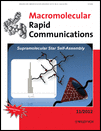
MACROMOLECULAR RAPID COMMUNICATIONS
Connecting Researchers with Cutting-Edge Macromolecular ResearchMACROMOLECULAR RAPID COMMUNICATIONS, published by WILEY-V C H VERLAG GMBH in Germany, is an esteemed journal dedicated to the rapid dissemination of high-quality research in the fields of materials chemistry, organic chemistry, and polymers and plastics. With a remarkable 2023 impact factor securing its place in the prestigious Q1 category across three key disciplines, the journal ranks impressively within the top quartiles of the Scopus metrics, standing at 36th in organic chemistry and 35th in polymers and plastics. Although the journal does not offer open access options, its informative depth and innovative research make it an invaluable resource for researchers, professionals, and students seeking to stay abreast of the latest developments in macromolecular science. Covering a broad spectrum of topics from fundamental research to applications, MACROMOLECULAR RAPID COMMUNICATIONS aims to foster collaboration and inspire further advancements within the scientific community.

International Journal of Polymer Science
Pioneering Research in the Polymer LandscapeInternational Journal of Polymer Science is a prominent and peer-reviewed journal dedicated to advancing the field of polymer science. Published by Hindawi Ltd, this open-access journal has been making significant contributions to the discipline since its inception in 2009, ensuring that research findings are accessible to a global audience. With an impressive impact factor and positioned in the Q2 quartile for Polymers and Plastics as of 2023, it ranks 46th out of 161 in the Scopus database, reflecting its strong standing in the research community. The journal welcomes innovative research across various topics within polymer science, including synthesis, characterization, and applications in diverse industries. By providing a platform for scholars, professionals, and students, the International Journal of Polymer Science not only encourages the dissemination of knowledge but also fosters collaboration and innovation in this essential field. Based in Egypt and operating under a rigorous selection process, it remains a vital resource for anyone involved in polymer research.

POLYMER
Transforming Ideas into Polymer SolutionsPOLYMER, an esteemed journal published by Elsevier Science Ltd, stands at the forefront of polymer science, presenting cutting-edge research that encompasses the realms of Materials Chemistry, Organic Chemistry, and Polymers and Plastics. With a remarkable impact factor reflecting its significance in the academic community, POLYMER has been a vital resource since its inception in 1960, contributing to a converged body of knowledge through to 2024. Rated Q1 in all relevant categories as of 2023, and boasting impressive Scopus rankings, this journal not only facilitates advanced discussions in polymer synthesis, characterization, and applications but also serves as a critical platform for collaborative research among scholars, professionals, and students. While it offers content primarily via subscription, POLYMER remains dedicated to fostering innovation and excellence in the field, making it an essential read for anyone passionate about polymer science.
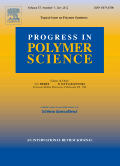
PROGRESS IN POLYMER SCIENCE
Exploring New Dimensions in Polymer ApplicationsPROGRESS IN POLYMER SCIENCE is a prestigious academic journal published by PERGAMON-ELSEVIER SCIENCE LTD, dedicated to advancing the field of polymer science. With an ISSN of 0079-6700 and an E-ISSN of 1873-1619, this journal has established itself as a leading source of high-quality research since its inception in 1967. It ranks in the top quartile (Q1) across multiple categories including Ceramics and Composites, Materials Chemistry, Organic Chemistry, Polymers and Plastics, and Surfaces and Interfaces, reflecting its strong reputation and impact within the scientific community. The journal features rigorous peer-reviewed articles that not only contribute to theoretical advancements but also emphasize practical applications of polymer science in various industries. Although it is not an open-access journal, it remains accessible through institutional subscriptions and provides invaluable insights and data for researchers, professionals, and students alike. PROGRESS IN POLYMER SCIENCE is essential reading for anyone looking to stay abreast of the latest developments and innovations in this dynamic field.

JOURNAL OF APPLIED POLYMER SCIENCE
Innovating Applications, Transforming MaterialsThe Journal of Applied Polymer Science, published by Wiley, is a leading journal in the field of polymer science, showcasing innovative research and applications in various domains since its inception in 1959. With an ISSN of 0021-8995 and an E-ISSN of 1097-4628, it is indexed in prominent databases, maintaining a strong presence with Scopus rankings placing it in the Q2 category across multiple disciplines, including Chemistry, Materials Chemistry, and Polymers and Plastics. The journal’s commitment to advancing scientific knowledge is reflected in its impact on the materials science community, with noteworthy rankings such as #38 in Surfaces, Coatings and Films and #51 in Polymers and Plastics. Though not an open-access publication, it remains a vital resource for researchers, professionals, and students aiming to deepen their understanding of polymer applications and to stay abreast of the latest developments in this ever-evolving field. With a focus on high-quality research, the Journal of Applied Polymer Science continues to be a cornerstone for those engaged in polymer research and its myriad applications.

POLYMER BULLETIN
Advancing Knowledge in Polymer Chemistry and MaterialsPOLYMER BULLETIN is a prominent journal in the field of polymer science, published by SPRINGER in Germany. Established in 1978, this peer-reviewed journal focuses on the latest research and developments in polymer chemistry, materials science, and condensed matter physics, boasting a commendable impact factor indicative of its rigorous academic standards. With a Q2 ranking in multiple categories including Chemistry (Miscellaneous), Condensed Matter Physics, Materials Chemistry, and Polymers and Plastics, POLYMER BULLETIN serves as an essential resource for researchers, professionals, and students aiming to stay abreast of innovative findings and methodologies within these interdisciplinary landscapes. Although the journal does not currently offer open access, it provides invaluable insights and data that significantly contribute to the advancement of polymer science. For more information and to access published articles, visit the journal's page on the Springer website.
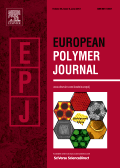
EUROPEAN POLYMER JOURNAL
Unraveling the Potential of Polymers and PlasticsEUROPEAN POLYMER JOURNAL is a leading academic journal published by PERGAMON-ELSEVIER SCIENCE LTD, dedicated to advancing the field of polymer science and engineering. With a distinguished history since 1965, this journal serves as a critical platform for researchers to disseminate high-quality research findings within a broad scope that encompasses materials chemistry, organic chemistry, and physics. The journal boasts an impressive Q1 category ranking in multiple fields, including Materials Chemistry, Organic Chemistry, and Polymers and Plastics, placing it in the top tier of academic journals worldwide. Its standing is further reinforced by its high citation metrics, with ranks such as #16 in Organic Chemistry and #20 in Polymers and Plastics, reflecting its significant contribution to the advancement of knowledge and innovation in these areas. Although currently not available as an open-access journal, it provides subscribers with in-depth studies, reviews, and insights relevant to both academia and industry. Researchers, professionals, and students alike will find invaluable information and emerging trends in polymer research, making the EUROPEAN POLYMER JOURNAL an essential resource for staying at the forefront of this dynamic and evolving field.

POLYMER SCIENCE SERIES C
Advancing the Frontiers of Polymer ResearchPOLYMER SCIENCE SERIES C is a distinguished journal published by MAIK NAUKA/INTERPERIODICA/SPRINGER, focusing on advancing research in the fields of polymer science and materials chemistry. With an ISSN of 1811-2382 and an E-ISSN of 1555-614X, this journal has been actively disseminating vital findings since its inception in 2000, aiming to converge knowledge and innovations until 2024. Operating out of the United States, it stands out with its current quartile rankings of Q3 across several categories, including Chemistry (miscellaneous), Materials Chemistry, and Polymers and Plastics, highlighting its evolving significance in the academic community. Despite its open access status, the journal attracts an engaged audience of researchers, professionals, and students, providing a platform for the publication of rigorous peer-reviewed articles that explore the intricacies of polymer synthesis, characterization, and applications. POLYMER SCIENCE SERIES C not only serves as a vital resource for keeping abreast of recent developments in polymer research but also stimulates interdisciplinary collaborations and innovative approaches in material science.
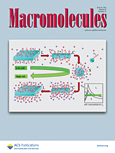
MACROMOLECULES
Exploring the Frontiers of Polymer ScienceMACROMOLECULES, published by the American Chemical Society, is a premier journal in the fields of inorganic chemistry, materials chemistry, organic chemistry, and polymers and plastics. Since its inception in 1968, this influential journal has established itself as a vital resource for researchers, professionals, and students, showcasing cutting-edge research and advancements in the study of macromolecules and high-performance polymers. With a distinguished impact factor and consistently ranking in the top quartiles (Q1) across its relevant categories, MACROMOLECULES is recognized for its high-quality publications that contribute significantly to the scientific community. The journal is accessible in both print and electronic formats, facilitating rapid dissemination of knowledge. By providing a platform for innovative studies and groundbreaking discoveries, MACROMOLECULES continues to play a crucial role in shaping the future of materials science and polymer research.
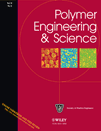
POLYMER ENGINEERING AND SCIENCE
Elevating Polymer Science to New HeightsPOLYMER ENGINEERING AND SCIENCE, published by WILEY, is a premier journal specializing in the field of polymer science and engineering. Since its inception in 1961, this journal has been at the forefront of disseminating high-quality research, focusing on various aspects of polymers and plastics, including their chemistry, properties, and applications. With an impressive impact factor, it ranks in the second quartile (Q2) across multiple categories, including Chemistry (Miscellaneous), Materials Chemistry, and Polymers and Plastics, showcasing the journal's significance and influence in these vital areas of research. Researchers and professionals in academia and industry will find the latest advancements and innovative methodologies in polymer science, making this journal an essential resource for those looking to stay updated on cutting-edge developments. While it does not currently support Open Access, its comprehensive scope and critical insights positioned it as a valuable platform for advancing knowledge and fostering collaboration within the polymer community. The journal’s office is located at 111 River St, Hoboken 07030-5774, NJ, United States, emphasizing its strong presence in the academic landscape.